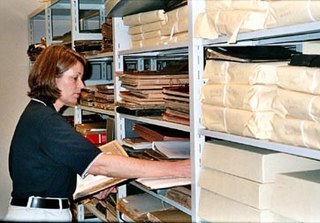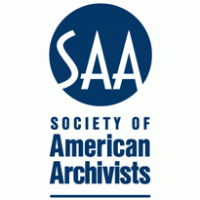
The Historical Records Survey (HRS) was a project of the Works Progress Administration New Deal program in the United States. Originally part of the Federal Writers' Project, it was devoted to surveying and indexing historically significant records in state, county and local archives. The official mission statement was the "discovery, preservation, and listing of basic materials for research in the history of the United States". The creation of the Historical Records Survey was one of the signal events "in what Solon Buck called the 'archival awakening' of the 1930s".

An archivist is an information professional who assesses, collects, organizes, preserves, maintains control over, and provides access to records and archives determined to have long-term value. The records maintained by an archivist can consist of a variety of forms, including letters, diaries, logs, other personal documents, government documents, sound and/or picture recordings, digital files, or other physical objects.

The Society of American Archivists is the oldest and largest archivist association in North America, serving the educational and informational needs of more than 5,000 individual archivist and institutional members. Established in 1936, the organization serves upwards of 6,200 individual and member institutions.
Samuel Badisch Ornitz was an American screenwriter and novelist from New York City; he was one of the "Hollywood Ten" who were blacklisted from the 1950s on by movie studio bosses after his appearance before the House Un-American Activities Committee when he was held in contempt of Congress for refusing to testify about his alleged membership in the Communist Party. In his later years, he wrote novels, including Bride of the Sabbath (1951), which became a bestseller.

Archival science, or archival studies, is the study and theory of building and curating archives, which are collections of documents, recordings, photographs and various other materials in physical or digital formats.
The American Jewish Historical Society (AJHS) was founded in 1892 with the mission to foster awareness and appreciation of American Jewish history and to serve as a national scholarly resource for research through the collection, preservation and dissemination of materials relating to American Jewish history.
Howard Besser is a scholar of digital preservation, digital libraries, and preservation of film and video. He is Professor of Cinema Studies and the founding director of the NYU Moving Image Archiving and Preservation Program ("MIAP"), a graduate program in the Tisch School. Besser also worked as a Senior Scientist at New York University's Digital Library Initiative. He conducted extensive research in image databases, multimedia operation, digital library, and social and cultural influence of the latest Information Technology. Besser is a prolific writer and speaker, and has consulted with many governments, educational institutions, and arts agencies on digital preservation matters. Besser researched libraries' new technology, archives, and museums. Besser has been actively contributing at the international level to build metadata and upgrade the quality of the cultural heritage community. He predominantly, focused on image and multimedia databases; digital library aspects ; cultural and societal impacts of information technology, and developing new teaching methods through technology such as web-based instructions and distance learning. Besser was closely involved in development of the Dublin Core and the Metadata Encoding and Transmission Standard (METS), international standards within librarianship.

Sir Charles Hilary Jenkinson was a British archivist and archival theorist, regarded as the figure most responsible for bringing continental European concepts of archival theory to the English-speaking world.
Original order is a concept in archival theory that a group of records should be maintained in the same order as they were placed by the record's creator. Along with provenance, original order is a core tenet of the archival concept of respect des fonds. A primary goal of keeping records in their original order is to preserve additional contextual information about the records' creator and the environment of their creation. Original order also encourages the archivist to remain neutral as opposed to applying any interpretation to the records.
"More Product, Less Process: Revamping Traditional Archival Processing" is a 2005 archival science article written by Mark A. Greene and Dennis Meissner that first appeared in the Fall/Winter 2005 issue of The American Archivist. The paper argues that traditional archival processing is too slow, and advocates for the use of minimal processing in order to reduce backlogs and provide access to archival collections as quickly as possible. The ideology presented in the article, abbreviated as MPLP, has since been widely adopted in modern archival theory with subsequent praise directed primarily towards the ability to increase user accessibility without prohibiting the option for future processing.
The Academy of Certified Archivists is an American independent, nonprofit organization of professional archivists founded in 1989.

Harold Thomas Pinkett was an African-American archivist and historian. In 1942, he became the first African-American archivist employed at the National Archives of the United States. He was also the first African-American to become a fellow of the Society of American Archivists and to be editor of the journal The American Archivist. He was an expert in agricultural archives, and served as president of the Agricultural History Society.
Danna C. Bell is an archivist and librarian at the Library of Congress. Bell served as president of the Society of American Archivists from 2013 to 2014 and serves on the Advisory Committee on the Records of Congress. Bell has been invited to many national and international events and conferences on archives and special collections, including the ARL/SAA Mosaic Program Leadership Forum in 2016. She is active in the archives profession and writes and speaks on the importance of archival work.
Sue E. Holbert was an American archivist with the Minnesota Historical Society and the Minnesota State Archivist (1979–1993). She is now the owner of Booklady Used and Rare Books in Chicago, Illinois.
Susan Tucker is an American archivist. She was the Curator of Books and Records for the Newcomb Archives and Vorhoff Library at Newcomb College of Tulane University for over 30 years. She retired in 2015. She is a longtime member of the Society of American Archivists and is active in the Women's Collection Roundtable. She is now an archival consultant specializing in genealogy and family records.
Michelle Caswell is an American archivist and academic known for her work regarding community archives and approaches to archival practice rooted in anti-racism and anti-oppression. She is an associate professor of archival studies in the Department of Information Studies at University of California, Los Angeles and is the director of the school's Community Archives Lab.
Eron Rowland (1861/2-1951), born Eron Opha Moore and also known as Eron Moore Gregory, was a historian, author and the wife of Andrew E. Gregory until his death in 1900, and later Dunbar Rowland. With Rowland, she helped develop the Mississippi Department of Archives and History which holds many of the family's papers.
Ricardo L. Punzalan is a Filipino American archivist who is an Associate Professor of Information at the University of Michigan School of Information. He has shaped the fields of archival science, virtual reunification, repatriation, reparative description, and has studied the nature of collections in both museums and archives. He holds undergraduate and Masters degrees from the University of the Philippines and a doctorate in information science from the University of Michigan.
Marika Cifor is an American archivist and feminist academic known for her work in archival science, library science, and digital studies. Her research focuses on community archives, HIV/AIDS, affect theory, and approaches to archival practice rooted in social justice. She is an assistant professor at the University of Washington Information School. She also holds an adjunct faculty appointment in UW's Gender, Women and Sexuality Studies department.
The Council of State Archivists (CoSA) is a non-profit membership association of the United States state and territorial government archives.






